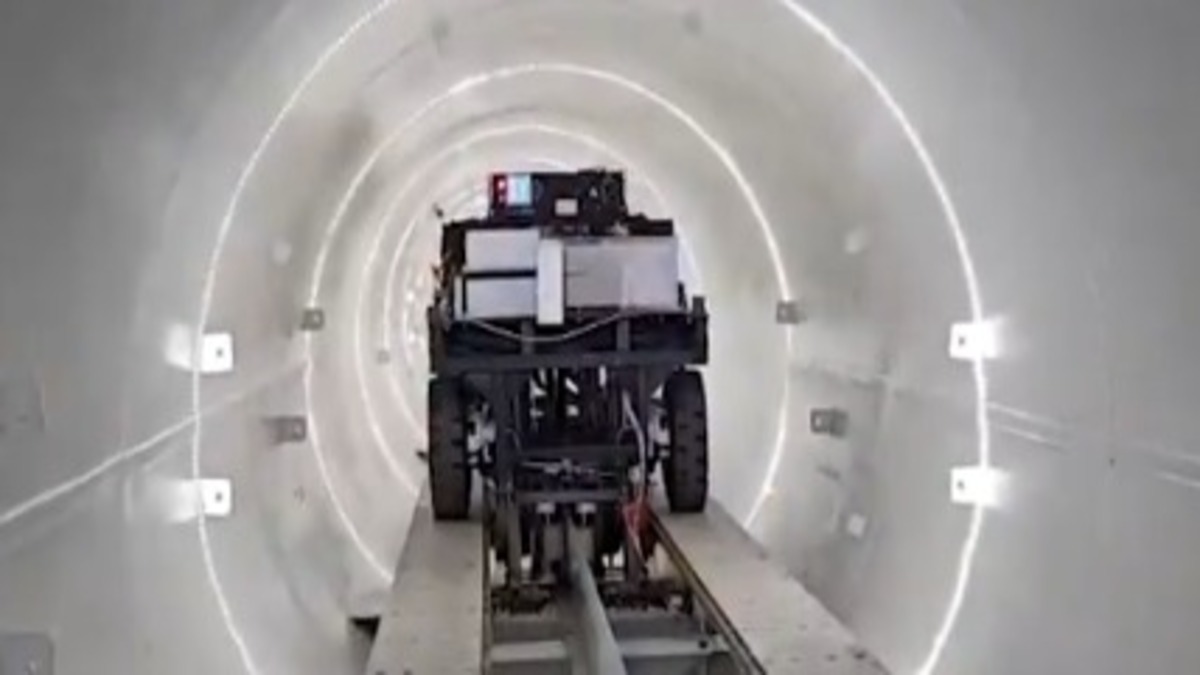India’s transport system is set to witness a major revolution.
The country’s first-ever hyperloop test track in Chennai was tested on Monday successfully.
The 422-metre-long track was developed by the Indian Institute of Technology (IIT) Madras, in collaboration with the Ministry of Railways.
It promises to redefine high-speed travel.
Here’s all we know about it.
India’s first Hyperloop test track tested
The hyperloop project at IIT Madras is known as Avishkar Hyperloop.
Developed in collaboration with the Indian Railways and L&T Constructions, the first test track of 422 metres has been built within the IIT Madras campus.
By using vacuum tubes, the project intends to build a high-speed transport system that can carry passengers at up to 1,100 kilometres per hour.
It can perhaps go about 350 kilometres in 30 minutes.
This could make it possible for passengers to travel nearly 300 kilometres from Delhi to Jaipur in less than 30 minutes.
Two grants of $1 million each have already been granted to the initiative, which is entirely sponsored by Indian Railways.
Following the success of the initial test track, Railway Minister Ashwini Vaishnaw said, “The first pod of 422 metres will go a long way in developing technologies. I think the time has come when, after the first two grants of one million dollars each, the third grant of one million dollars will be given to IIT Madras for further developing the hyperloop project."
The hyperloop project at @iitmadras; Government-academia collaboration is driving innovation in futuristic transportation. pic.twitter.com/S1r1wirK5o
— Ashwini Vaishnaw (@AshwiniVaishnaw) February 24, 2025
He also shared a video of the testing on X with the caption: “The hyperloop project at @iitmadras; Government-academia collaboration is driving innovation in futuristic transportation, and added that the Indian Railways will start the first commercial project when the technology has been thoroughly tested and ready.
“We’ll decide a site which can be used for good commercial transportation of let’s say some 4,050 kilometres,” he said.
“India has great potential for hyperloop. It is estimated that a 40-kilometre test track would cost $150-300 million upon completion, depending on the dimension for the project,” Economic Times quoted Swisspod Technologies CEO and co-founder Denis Tudor.
In March of last year, a Memorandum of Understanding (MoU) was signed between India’s TuTr and Tudor’s Swiss-American business.
About the latest technology
Hyperloop is a high-speed transportation system designed for long-distance travel.
It is often dubbed the “fifth mode of transport” alongside road, rail, air, and water.
Swiss professor Marcel Juffer came up with the first Hyperloop concept in the 1970s. Swissmetro SA was established in 1992 to work on this project, however, it fell out of business in 2009.
The technology utilises customised capsules or pods that are driven at extraordinary speeds through near-vacuum tubes.
The vision of the hyperloop is to reach speeds that are comparable to or even higher than those of flights by significantly lowering air resistance and friction.
In full-scale systems, the pods in hyperloops are said to be able to reach speeds of up to 1,200 kilometres per hour.
The track for Hyperloop can be built either above or below ground.
Unlike trains or cars that have wheels, the pods are developed to float on air skis, or use magnetic levitation (maglev) technology to lower friction, reported ZDNET.
“Hyperloop will be marked by its immunity to weather, collision-free commute which can move at twice the speed of a plane, with low power consumption and energy storage for 24-hour operations,” an official press release said.
Hyperloop travel can change the way we travel. If it becomes a reality, it could complement the Metro rail network and even reduce congestion.
Hyperloop in other countries
In 2013, Tesla CEO Elon Musk released a white paper on the high-speed transportation system, reigniting interest in Hyperloop technology.
According to ZDNET, he suggested operating a service between Los Angeles and San Francisco, California, to move people and goods.
To actualise the Hyperloop idea, Hyperloop One was founded in 2014 based on this concept. However, the project encountered difficulties due to its feasibility.
Currently, Musk’s own company, The Boring Company, is studying Hyperloop technology.
Hardt, a Hyperloop firm based in the Netherlands, announced in September last year that it had successfully tested a vehicle for the first time at its European Hyperloop Centre in Veendam.
Virgin Hyperloop has also been actively testing its systems in Nevada. However, the company has shifted focus to freight applications due to the challenges of passenger certification.
TransPod, a Canadian company, is also constructing a test track to validate its design, which uses a unique propulsion and levitation system.
China too plans for a Hyperloop-like system capable of hypersonic speeds.
With inputs from agencies


)

)
)
)
)
)
)
)
)



